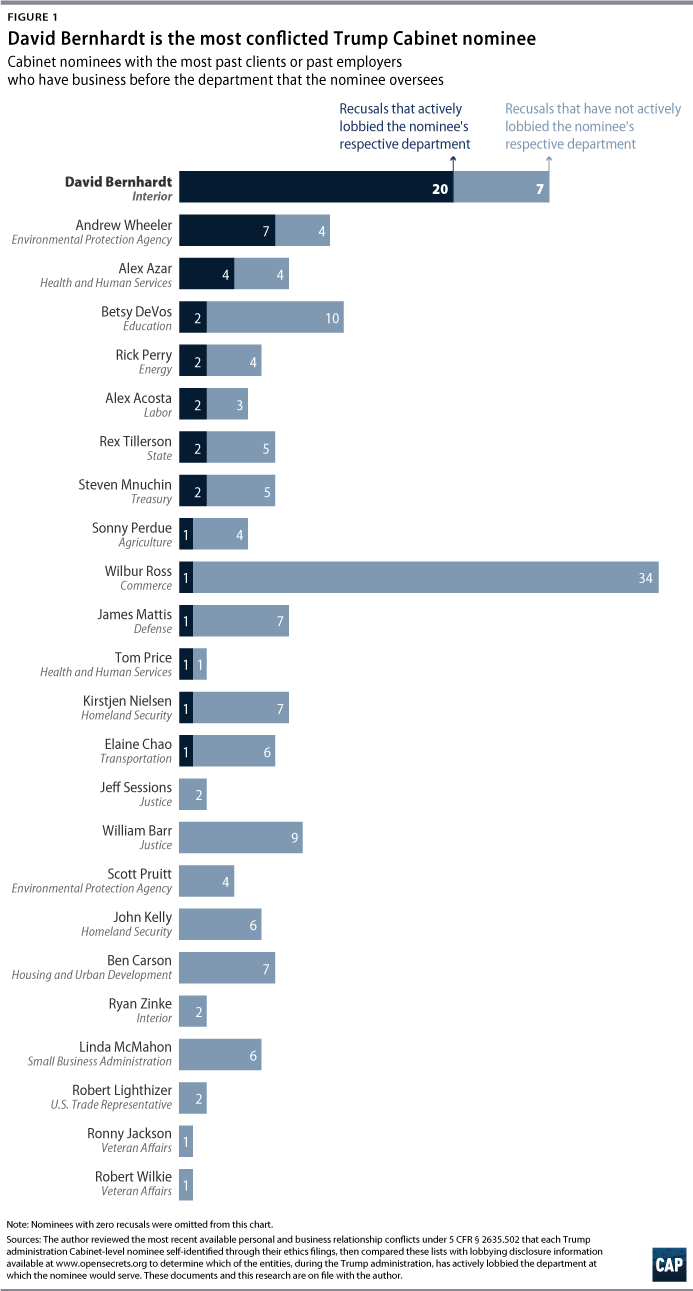On the whole, President Donald Trump’s Cabinet has not demonstrated integrity, honesty, or accountability to the American public. Four top Trump administration officials have resigned under a cloud of corruption after wasting taxpayer dollars or abusing their position for personal gain: U.S. Secretary of Health and Human Services Tom Price; Environmental Protection Agency (EPA) Administrator Scott Pruitt; U.S. Secretary of Veteran Affairs David Shulkin; and U.S. Secretary of the Interior Ryan Zinke.
Rather than cleaning house in the wake of these controversies and resignations, President Trump is doubling down on nominating conflicted individuals to his Cabinet. In February, the U.S. Senate confirmed former coal lobbyist Andrew Wheeler as Pruitt’s replacement at the EPA, the federal agency that enforces air and water protections. And this month, Trump nominated David Bernhardt to lead the U.S. Department of the Interior. Currently serving as the acting interior secretary since Zinke’s departure, Bernhardt is a former oil and gas lobbyist—and has so many conflicts of interest that he must carry around a list of former clients to remember them.
Bernhardt’s conflicts show a possible favor factory for former clients
In fact, a Center for American Progress analysis has determined that Bernhardt has the dubious distinction of being the most conflicted of all 31 of President Trump’s Cabinet-level nominees. Most are now serving in the Cabinet, while a few withdrew their nominations. Of the 27 former clients and employers with potential conflicts of interest that Bernhardt disclosed on his ethics forms, lobbying disclosure data reveal that 20 have actively lobbied the Department of the Interior since the beginning of 2017. This number dwarfs other Cabinet nominees’ known direct conflicts of interest. The analysis also revealed that Bernhardt has more conflicts than Price, Pruitt, Shulkin, and Zinke combined. (see Methodology)

Bernhardt’s high number of conflicts of interest is deeply concerning, as it makes his department vulnerable to corruption and capture by corporate interests. Indeed, a growing number of reports are beginning to shed light on the problematic consequences of Bernhardt’s conflicted leadership. In a recent New York Times story, for example, Bernhardt claims to have received a “verbal” waiver from department ethics officials, allowing him to work on weakening Endangered Species Act protections for a fish species in California—an action that benefits one of Bernhardt’s former clients, Westlands Water District. In fact, a recent CNN investigative piece detailed 15 times since Bernhardt joined the Interior Department in which department policy changes benefited his former lobbying clients.
Bernhardt also has not been forthcoming about his public schedule, claiming recently that he does not “personally maintain” a calendar. This suggests that there is no complete record of whom he is meeting with on official department business. Without any sort of paper trail outlining when he is requesting or receiving ethics waivers for himself, the American public is left in the dark.
In short, Bernhardt’s many conflicts of interest, his secretive leadership style, and his apparent contempt for ethical norms make him unfit to serve as secretary of the interior.
Efforts to institute stronger ethics requirements for federal officials
Fortunately, policymakers and watchdog organizations are starting to pay attention. Several members of Congress and good government groups have written letters to the Department of the Interior’s inspector general and the U.S. Office of Government Ethics asking that they investigate whether Bernhardt’s questionable dealings have violated ethics codes. And earlier this month, the U.S. House of Representatives passed H.R. 1—the For the People Act of 2019—taking a giant step toward implementing stronger ethics requirements for federal officials.
Several provisions in H.R. 1 can be viewed as a direct rebuke to Bernhardt’s apparent practice of doling out special favors to his past lobbying clients. In particular, the bill establishes new criminal penalties for federal officials who participate in any particular matter in which a former employer or client has an interest. It also requires that any ethics waivers be put in writing and made public.
As the Senate considers Bernhardt’s nomination to become the next secretary of the interior, members of Congress should demand transparency on the ethics waivers—verbal or otherwise—that Bernhardt has sought or received. They should seek clarity on how Bernhardt tracks his time and whether he has violated the Federal Records Act. And they must take a hard look at whether he has violated any of his numerous recusals by continuing to meet with—or work on matters that benefit—former clients and employers. Failure to thoroughly vet President Trump’s most conflicted cabinet nominee will further erode the public’s trust in the federal government and may grant unprecedented access for special interests seeking to influence decisions being made at the Department of the Interior.
Marc Rehmann is the senior campaign manager for the Law of the Land Project at the Center for American Progress.
The author would like to thank Matt Lee-Ashley, Kate Kelly, Nicole Gentile, Carlos Rivero Lopez, Aleah Holt, Tricia Woodcome, and Meghan Miller for their contributions to this column.
Methodology
The author reviewed the most recent available personal and business relationship conflicts, as defined in 5 CFR § 2635.502, that each Trump Cabinet-level nominee self-identified through their ethics filings. Then-Deputy Interior Secretary Bernhardt and U.S. Secretary of Commerce Wilbur Ross had the most—with 27 and 35, respectively. The author then compared these lists with lobbying disclosure information to determine which of the entities, during the Trump administration, has actively lobbied the respective department at which the nominee would serve. With the consideration of the lobbying disclosure data, Bernhardt rose to the top, with 20 direct conflicts, while Ross’ direct conflicts dropped to 1. In short, Bernhardt is the Trump nominee with the highest number of past clients or past employers with business before the department that he would be running.
Back-end research and filings are on file with the author.